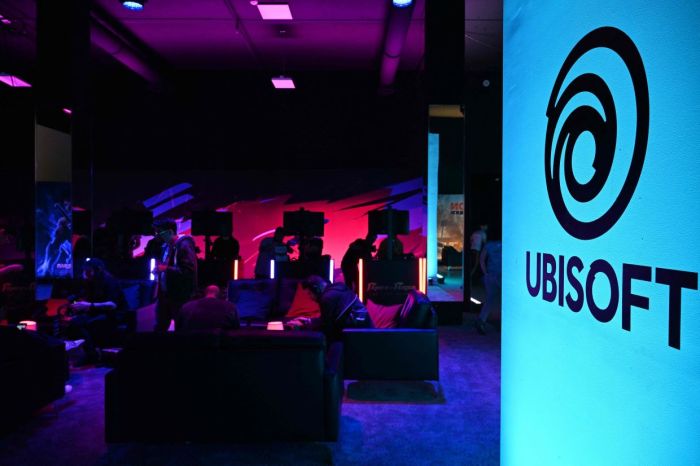Ubisoft’s VR Game Portfolio
Ubisoft, a prominent video game developer and publisher, has ventured into the virtual reality (VR) gaming space with a growing portfolio of titles. While not as extensive as its non-VR offerings, Ubisoft’s VR games showcase its exploration of the technology and its potential to deliver unique experiences.
VR Game Releases and Development
Ubisoft has released a range of VR games across various platforms, including PlayStation VR, Oculus Rift, and HTC Vive. These titles demonstrate Ubisoft’s commitment to exploring different genres and gameplay mechanics within the VR landscape.
- Eagle Flight (2016): A soaring adventure game where players take on the role of an eagle, exploring a post-apocalyptic Paris.
- Star Trek: Bridge Crew (2017): A cooperative multiplayer game that puts players in the captain’s chair of the USS Aegis, commanding a crew to complete missions and explore the galaxy.
- Transference (2018): A psychological thriller that uses VR to create a disorienting and immersive experience, blurring the lines between reality and simulation.
- Werewolves Within (2016): A social deduction game where players must uncover the werewolf among them, featuring both online and local multiplayer modes.
- Assassin’s Creed VR (2020): A standalone VR experience set within the Assassin’s Creed universe, allowing players to explore historical settings and engage in stealth combat.
Success and Reception
The reception of Ubisoft’s VR games has been mixed, with some titles receiving praise for their innovation and immersive experiences, while others have been met with more lukewarm responses.
- Eagle Flight was generally well-received for its stunning visuals and sense of freedom, though some criticized its lack of depth and repetitive gameplay.
- Star Trek: Bridge Crew was lauded for its immersive cooperative gameplay and its ability to capture the spirit of the Star Trek franchise.
- Transference received mixed reviews, with some praising its innovative storytelling and psychological atmosphere, while others found it frustrating and confusing.
- Werewolves Within became a popular party game, praised for its social interaction and strategic gameplay.
- Assassin’s Creed VR was a more modest release, receiving a mixed reception with some appreciating its faithfulness to the series, while others found it lacking in depth and substance.
Reasons for VR Game Development
Ubisoft’s decision to develop VR games is likely driven by a combination of factors, including:
- Exploring new technologies: VR represents a frontier in gaming, offering unique opportunities for immersive experiences and innovative gameplay.
- Diversifying its portfolio: By venturing into VR, Ubisoft can reach a wider audience and attract new players interested in this emerging platform.
- Testing new IPs and concepts: VR provides a platform for experimenting with new ideas and IPs, potentially leading to future successes in both VR and non-VR formats.
- Building a VR presence: Establishing a presence in the VR market allows Ubisoft to position itself as a leader in this growing segment of the gaming industry.
The Future of VR Gaming in the Ubisoft Ecosystem: Ubisoft Expresses Reserve Over Virtual Reality Gaming
Ubisoft’s current stance on VR gaming, while cautious, is not a complete dismissal. The company has already dipped its toes into the VR waters with titles like “Eagle Flight” and “Star Trek: Bridge Crew,” demonstrating an understanding of the potential of the technology. However, the company’s focus remains on traditional gaming experiences for the mainstream market.
This strategic approach, however, is likely to evolve as VR technology matures and consumer adoption increases. The future of VR gaming within Ubisoft’s ecosystem is not a closed book, but rather a chapter waiting to be written.
Factors Influencing Ubisoft’s Future VR Decisions
Several factors could influence Ubisoft’s future decisions regarding VR game development. These include:
- Technological Advancements: As VR hardware becomes more powerful, affordable, and accessible, Ubisoft will be better equipped to develop immersive and engaging experiences. The company’s investment in VR game development will likely increase as the technology evolves and offers greater creative possibilities.
- Market Demand: The growing popularity of VR gaming, particularly among younger generations, will be a significant driver for Ubisoft’s future decisions. A surge in demand for VR games will incentivize the company to invest more heavily in the space.
- Competitive Landscape: Ubisoft will closely monitor the success of other major game developers in the VR market. The success of VR games from competitors like Bethesda and Sony will likely influence Ubisoft’s own VR strategy.
Hypothetical Roadmap for Ubisoft’s VR Game Development
Based on these factors, a hypothetical roadmap for Ubisoft’s VR game development could look like this:
- Expansion of Existing Franchises: Ubisoft could leverage its established franchises like “Assassin’s Creed” or “Far Cry” to create VR experiences that cater to existing fan bases. Imagine exploring the bustling streets of Renaissance Florence in “Assassin’s Creed” or navigating the wild landscapes of “Far Cry” in a first-person perspective. These titles would appeal to both VR enthusiasts and existing fans, providing a compelling entry point into the VR world.
- Development of Original VR IPs: Ubisoft could also invest in developing entirely new VR IPs that capitalize on the unique capabilities of the technology. These games could explore innovative gameplay mechanics and storytelling approaches that are only possible in a VR environment. This approach would allow Ubisoft to experiment with new ideas and push the boundaries of VR gaming.
- Focus on VR-Specific Genres: Ubisoft could specialize in VR-specific genres like simulation, puzzle-solving, and social experiences. Games like “The Lab” by Valve have demonstrated the potential of VR for these genres, offering engaging and immersive experiences. Ubisoft could capitalize on this trend by developing VR titles that focus on these unique gameplay experiences.
The Impact of VR Gaming on the Gaming Industry
VR gaming has the potential to significantly reshape the gaming landscape, offering new avenues for player engagement and pushing the boundaries of traditional game development. Ubisoft, as a major player in the industry, is actively exploring the potential of VR and its implications for the future of gaming.
The Potential Challenges of VR Gaming
VR gaming presents a unique set of challenges that require careful consideration.
- Accessibility and Cost: VR headsets are currently more expensive than traditional gaming consoles, limiting accessibility for a wider audience. The high cost of entry could hinder the adoption of VR gaming, especially for casual players or those on a budget.
- Technical Limitations: VR technology is still evolving, and current hardware limitations can affect the performance and fidelity of VR games. This can result in motion sickness for some players, limited graphics, or reduced gameplay fluidity.
- Content Development: Developing immersive and engaging VR experiences requires specialized skills and resources. Creating compelling VR games can be more challenging and time-consuming compared to traditional game development, potentially leading to higher development costs and slower release cycles.
- User Experience: The physical nature of VR gaming can present challenges for user comfort and accessibility. Extended play sessions can lead to fatigue or discomfort, and accessibility for players with disabilities needs to be carefully considered.
The Opportunities Presented by VR Gaming, Ubisoft expresses reserve over virtual reality gaming
Despite the challenges, VR gaming offers a range of exciting opportunities for the industry:
- New Forms of Gameplay: VR allows for completely new forms of gameplay that are impossible in traditional gaming. Immersive experiences, physical interaction, and unique control schemes can lead to fresh and engaging gameplay mechanics.
- Enhanced Immersion: VR’s ability to immerse players in virtual worlds offers a level of engagement that surpasses traditional gaming. This can lead to more engaging storytelling, more compelling character interactions, and deeper emotional connections with the game world.
- New Revenue Streams: VR gaming can create new revenue streams for game developers and publishers. The potential for new game genres, virtual experiences, and interactive entertainment opens doors for innovative monetization strategies.
- Accessibility and Inclusivity: VR gaming can provide opportunities for players with disabilities to experience games in new ways. By offering adaptive controls and customizable settings, VR can enhance accessibility and inclusivity in gaming.
The Long-Term Implications of VR Gaming
VR gaming has the potential to fundamentally change how we play and experience games.
- Shifting Game Development: VR gaming will likely influence traditional game development, as developers explore new techniques and technologies to create more immersive experiences. This could lead to the integration of VR elements into traditional games or the development of hybrid game experiences.
- Evolving Player Expectations: As VR gaming becomes more mainstream, player expectations for immersion and interactivity will evolve. Traditional game development will need to adapt to meet these changing expectations, potentially leading to more immersive and engaging gameplay in all game genres.
- New Game Genres: VR has the potential to spawn entirely new game genres that are impossible in traditional gaming. These new genres could explore unique gameplay mechanics, storytelling, and interactive experiences, further expanding the boundaries of the gaming industry.
Ubisoft expresses reserve over virtual reality gaming – Ubisoft’s reservations about VR gaming, while a cause for speculation, ultimately reflect a measured approach to a rapidly evolving technology. Their focus on delivering high-quality experiences across various platforms, including VR, suggests a future where VR will play a role in their ecosystem. As the VR landscape continues to evolve, Ubisoft’s stance will undoubtedly shape the future of the gaming industry, providing valuable insights into the potential of this immersive technology.
While Ubisoft expresses reservations about the future of virtual reality gaming, it seems HTC is still pushing forward with their mobile VR strategy. The company has announced plans to deliver Android N updates for the HTC 10, One M9, and One A9, htc set to deliver android n updates for htc 10 one m9 and one a9 , which could make their phones even more appealing to VR enthusiasts.
Perhaps Ubisoft’s concerns are unfounded, and the VR market is about to take a big leap forward with the help of HTC and other innovative companies.
 Standi Techno News
Standi Techno News

